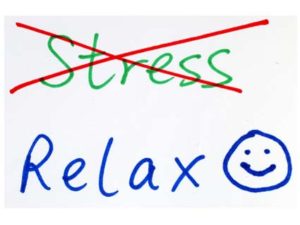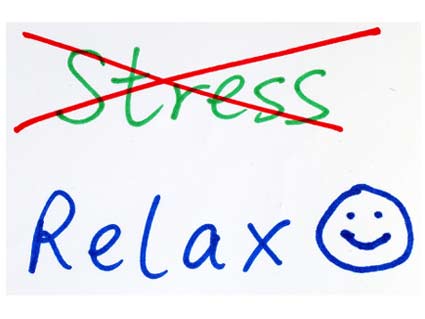Handling the Four Types of Stress
We live in a stressful world, yet some people cope beautifully, while others suffer serious consequences. It turns out that we must learn to deal with four types of stress, and those who do have better health, less illness, and a better outlook on life. Since April is Stress Awareness Month, let’s take a look at what the four types of stresses are and how you can deal with them.
First, there’s physical stress, also known as mechanical stress. This is the wear and tear on your body, especially your spine, walking and existing in a gravitational field that constantly pulls downward on your body, so it has to work to remain upright. This takes a lot of energy and puts mechanical strain on your body. Injuries, repetitive movements, arthritis, poor posture and bad body mechanics all contribute to physical stress. Signs of not adapting to physical/mechanical stress include back and neck pain, stiffness, headaches, vertigo, too much or too little motion of knees, ankles, shoulders or wrists, foot pain, and other painful ailments. The best ways to deal with this kind of stress are through exercise, yoga, massage and chiropractic care.
Second, we have chemical stress, also known as nutritional stress. This is the wear and tear on your organs and blood, usually caused by insufficient nourishment in food, intake of toxic substances like food additives, preservatives, genetically modified organisms (GMO) and  drug residues in the water supply. Pesticides, weed-killers and other farming chemicals can poison your food products; it is not bad enough to hurt you when you eat them, but it can accumulate in your body over time. Signs of not adapting to chemical/nutritional stress are obesity, diabetes, heart disease, cancer, allergies, skin conditions, food intolerances, and other metabolic illness. Even legitimate medications can create tremendous chemical stress in your body, so anything you can do to minimize the amount of unsafe substances you take into your body, and upgrade the quality of the food and nutrition you get, will make your metabolism work better. This will allow you to adapt better to your chemical/nutritional stresses. Learning to eat and drink to clean your bloodstream and nourish your cells with quality nutrition makes a significant difference.
drug residues in the water supply. Pesticides, weed-killers and other farming chemicals can poison your food products; it is not bad enough to hurt you when you eat them, but it can accumulate in your body over time. Signs of not adapting to chemical/nutritional stress are obesity, diabetes, heart disease, cancer, allergies, skin conditions, food intolerances, and other metabolic illness. Even legitimate medications can create tremendous chemical stress in your body, so anything you can do to minimize the amount of unsafe substances you take into your body, and upgrade the quality of the food and nutrition you get, will make your metabolism work better. This will allow you to adapt better to your chemical/nutritional stresses. Learning to eat and drink to clean your bloodstream and nourish your cells with quality nutrition makes a significant difference.
The third type of stress is mental stress, also known as emotional stress. This is the wear and tear on your mind, usually caused by perception of difficulty and the inability to adapt, in work, with family, with finances, with health or in relationships. Signs of not adapting to mental/emotional stress are nervousness, insomnia, digestive complaints, headaches, back and neck pain, anxiety, depression, anger management issues, and other psychological disorders. To handle such emotional stresses, you could practice stress relaxation techniques like meditation or yoga, or get some counseling. Often physical interventions, like exercise, chiropractic or massage, help to dissipate mental stresses. Sometimes these stresses work together, and their impact is amplified. For example, if you eat too much sugar or drink too much coffee, you may experience nervousness or jitteriness that is both a chemical and a mental stress. Long-term physical back pain can have a debilitating effect on mood or attitude, so it’s both a physical and an emotional stress. Therefore, chiropractors may discuss nutritional supplements, massage, modern stress reduction technology in addition to adjustments to help your body heal, recover, and cope with ongoing stressors in your life.
There’s a fourth kind of stress that is more prevalent now than ever before – it’s vibrational stress, also known as energetic stress. It’s the wear and tear on your energy field, usually caused by the electromagnetic pollution that surrounds us at all times. Cell phones, tablets, laptops, microwave ovens, television – we are constantly bathed in a sea of energy, and while our body handles much of it, the residue of this energy finds its way into our own energy field, interrupting normal tone in the body, especially the brain and nerve system. Signs of not adapting to vibrational stress, are fatigue, confusion, sleep problems, malaise and irritability. It can cross over into physical symptoms, like allergies, skin conditions, digestive complaints, and pain. There are many new approaches that address vibrational stress, like biofeedback, electromagnetic shielding, Epsom salt baths, crystal therapies and other new technologies. At least look to reduce the amount of time you willfully put yourself in a potentially disruptive energy field, like too much time on phone or tablet, or excessive exposure to known radiation sources.
It should be obvious that stress is a very serious topic. Experts have discovered that up to 90% of all disease is caused by some aspect of unresolved stress. We should all be doing everything we can to minimize our current stresses, avoid future stresses, and invest in recovery from our previous stresses. It’s the shortest distance between you and great, vibrant glowing vitality. If stresses are taking a toll on your health and you need some help or guidance dealing with them, call to schedule a consultation!

